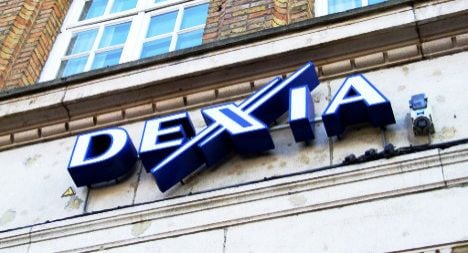The two states, shareholders in a bank that specialises in investing in local government funds, acted as Dexia faced the threat of becoming the first major European institution to fall victim to eurozone debt crisis.
Shares in the Franco-Belgian bank plunged more than 37 percent in early trade on Tuesday, later trimming the closing loss to around 20 percent, as French and Belgian finance ministers issued a statement of support.
“In the framework of Dexia’s restructuring, the governments of France and Belgium, in coordination with our central banks, will take all necessary steps to ensure the protection of depositors and creditors,” they said.
“To this end, they undertake to guarantee any finance raised by Dexia.”
In Brussels, Belgium’s central bank moved to reassure account holders, saying the central banks of both Belgium and France “fully support” Dexia.
“The two central banks have followed the financial situation of Dexia for a while. They are consulting with Belgian and French authorities and support the structural measures outlined by the group,” the National Bank of Belgium (BNB) said in a statement.
In Paris, officials said a French state investment fund and the banking arm of the French postal service are jointly working on a plan to take on some of the activities of the ailing bank.
The Caisse des Depots and the state-owned Banque Postale plan to take over the financing of around @80 billion ($105 billion) of the French and Belgian local government assets now on Dexia’s books, CDC officials told AFP.
The officials said CDC director general Augustin de Romanet hopes to put a formal version of the plan to the board of governors “in the shortest time possible, doubtless in the next few days.”
French Finance Minister Francois Baroin compared the state guarantee to the countries’ earlier €6.4-billion bailout of Dexia in 2008, when it was hit by the US sub-prime loan crisis.
He said the governments would again “answer ‘present’,” if called upon, in order to protect “deposits in Belgium and loans to local governments.”
Dexia is the leading provider of local government financing in France.
“Whatever happens, we will put in place a quick and effective solution which will guarantee there will be no collapse for this vital activity,” Baroin said.
However, he did not spell out that there would be an eventual injection of state capital.
“All we are saying is the states will be present like in 2008,” he said.
For his part, Belgian Finance Minister Didier Reynders confirmed one option was to set up a so-called “bad bank” to house Dexia’s riskiest debts while protecting its core business.
“France and Belgium are ready to guarantee the financing of Dexia, in whatever form it takes,” he said. “We’ve spoken a lot about a ‘bad bank’ — It’s one of the options.”
Belgium’s government was to hold an emergency meeting to assess the situation in Dexia late on Tuesday, Reynders added.
Late on Monday, the Franco-Belgian bank had held an emergency board meeting which left open the possibility of it being broken up.
“The worsening of the European sovereign debt crisis and the tensions on the interbank market led Dexia to accelerate its restructuring plan in May 2011,” the bank said after a six-hour crisis meeting in Brussels.
“However, in the current environment, the size of the non-strategic asset portfolio (so-called ‘legacy’) impacts the Group structurally despite the good credit quality of its assets,” it explained.
“This is why the Board of Directors asked the CEO … to prepare the necessary measures to resolve the structural problems penalising the Group’s operational activities,” it said.
Jean-Michel Cappoen, the head of the Belgian financial sector union Setca, told AFP: “According to the information we obtained after this meeting, the whole bank is up for sale. It’s the end of the road.”
Dexia’s shares had alreay lost more than 10 percent on Monday on warnings of an imminent credit rating downgrade over fears about its liquidity and wider concerns of exposure to eurozone sovereign debt.
“This is the first bank that has really been hit by the current crisis,” said trader Dov Adjedj at BGC Aurel securities. “It was already weak due to its very high level of assets.”
Some €95 billion in troubled non-strategic assets that are weighing heavily on the bank could be split off into a “bad bank” or other vehicle.
Other assets would be split off and sold, including a Turkish banking unit, asset management services, private banking, and retail banking in Belgium.


 Please whitelist us to continue reading.
Please whitelist us to continue reading.